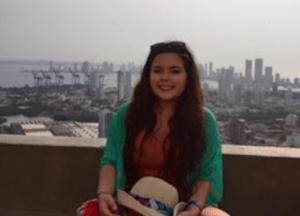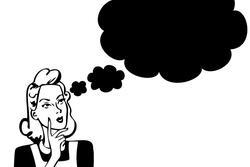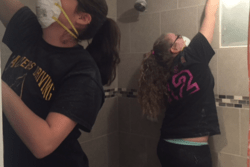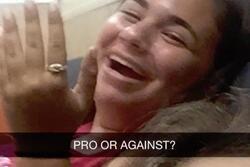Politics and My Dual Identity
For a socially introverted girl like me, talking openly about my opinions can be a challenge. Whether I’m in the classroom, out with friends, or at youth group events, my mouth usually stays shut. Instead, my ears become attuned to every whispered secret, every heated shout, and every thoughtful comment around me. I love to listen to other people’s perspectives, and jump in only when I feel that staying silent isn’t an option. When I’m passionate about something, I can temporarily push my introverted nature aside, and speak up.
If there is one thing in the world that I am passionate about, it’s my heritage. I was born from the love between a nice Jewish boy from New York, and a strong Hispanic woman from Colombia. I am proud to say that I eat both matzah ball soup and ajiaco (a Colombian soup made with chicken and potato). I sing songs by Reform musician Dan Nichols as well as Colombian rock star Carlos Vives. I learn about my Judaism from my Grandma and Grandpa, and about my Colombian roots from my abuelita. I am very proud and comfortable with both of these parts of my identity, but I struggle with the often subtle (and mostly unintentional) lack of understanding from my peers.
I’ll be the first to admit that “Hannah Himmelgreen” does not sound like your typical Hispanic name, and that when most people look at me, they don’t see a Latina. A few weeks ago, I had a conversation with a boy, let’s call him Mark, who definitely didn’t recognize this aspect of my identity. He said, totally out of the blue, “So did you hear about what happened in Colombia? That failed peace deal?” Yes. Of course I had. Who hadn’t? The prospect of a peace contract between the Colombian government and the FARC rebels had been in the making for four years, and the world was buzzing about it. It could signify an end to more than 50 years of war, kidnapping, and murder.
Except the referendum ended on October 2 with a surprising “No” vote against the deal.
I had heard about the decision that night, right after leaving Erev Rosh Hashanah services. Immediately, my Twitter feed started blowing up. When I saw what the commotion was about, my heart sank a little bit. It’s hard to articulate exactly what you want to say in 140 characters, but nevertheless, I keenly felt the judgment that thousands of people had expressed online. One common trend was condemnation of the 51% of Colombians who said “no to peace.” This infuriated me. Statements like this implied a snap judgment that did not reflect knowledge of the Colombian conflict.
I won’t pretend that I know everything about the situation. I’ve never lived in Colombia or personally witnessed the destruction, fear, and anger that this war has caused for millions of people. However, I have been educated by my mother and my grandmother on the harsh realities of the conflict. There is so much more to the referendum than a “yes” or a “no.” I understand that some people didn’t want to see rebels get away with their crimes, which is what the deal addressed. In voting, Colombians were not saying “no to peace.” They were saying “no to injustice.”
When I explained this view to Mark, he scoffed. “How can you know? You’re Jewish, right?”
I was totally taken aback by his response. What did my religion have to do with my opinion on this issue? All I had ever known was the blending of these two cultures, but now, here was this guy erasing part of my identity, simply based on my appearance. It hurt me deeply.
I proceeded to inform him of my background, and explain that these two identities aren’t mutually exclusive. Instead of listening to me, though, he insisted that what I was saying just “didn’t make sense.” When he couldn’t refute all of my points, he clearly grew uncomfortable and wanted to end the discussion. “This is why I don’t talk to girls about politics. You get too emotional about it.” As if discounting my Hispanic heritage wasn’t enough, he also felt the need to criticize what he perceived as a negative, inherently female trait. Great.
As he walked away, I grew angrier. His shortsighted perception of me, and his male ego, had clouded his ability to hear what I had to say. His refusal to respect my opinions was demeaning. However, as the seconds passed and I returned to a state of relative calmness, I realized that what I needed to do from now on was speak up, not stand back. I’ve spent so many conversations on the sidelines, not wanting to contribute because I was scared of how other people would perceive me. But in doing that, I allowed them to create their own distorted images of who I am. While this interaction was upsetting, it taught me what to do when people make assumptions about my intellect or opinions based on who I appear to be. I am a proud Hispanic Jewish woman, and no one gets to erase or demean any part of my unique identity. And if they try, I will speak up.
This piece was written as part of JWA’s Rising Voices Fellowship.







